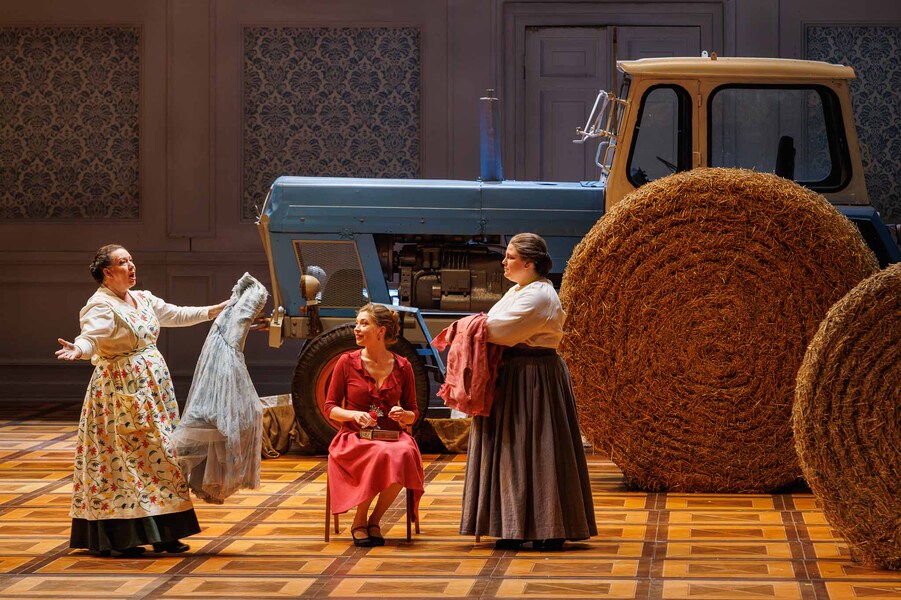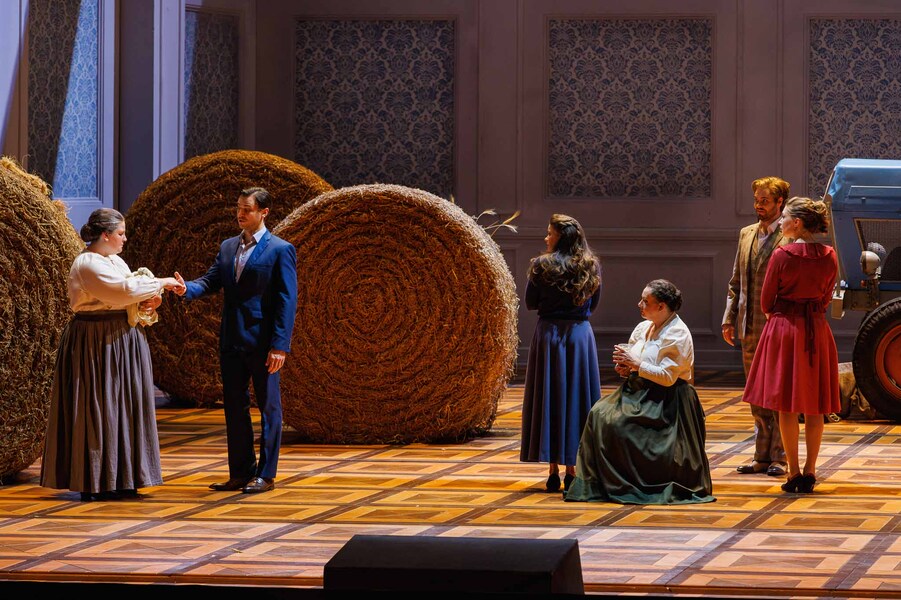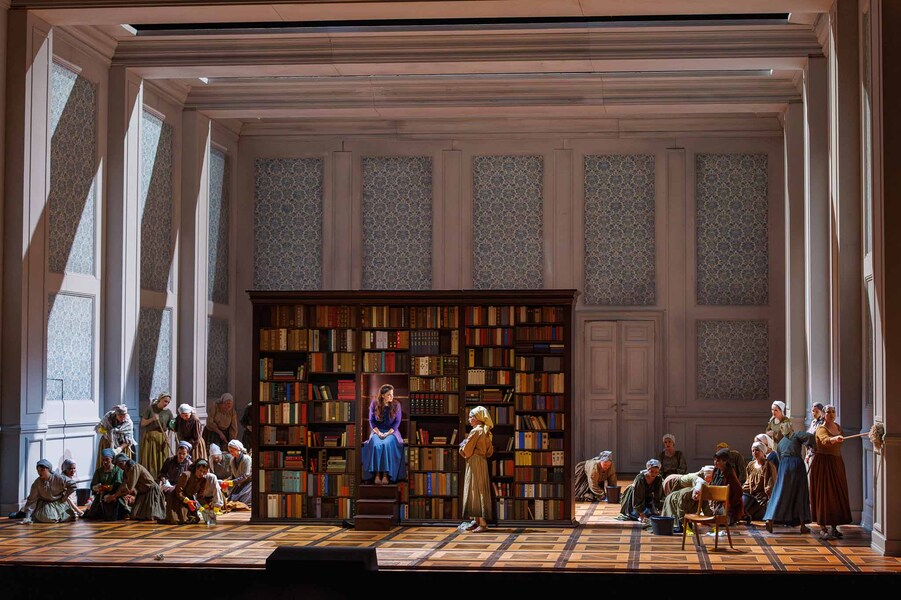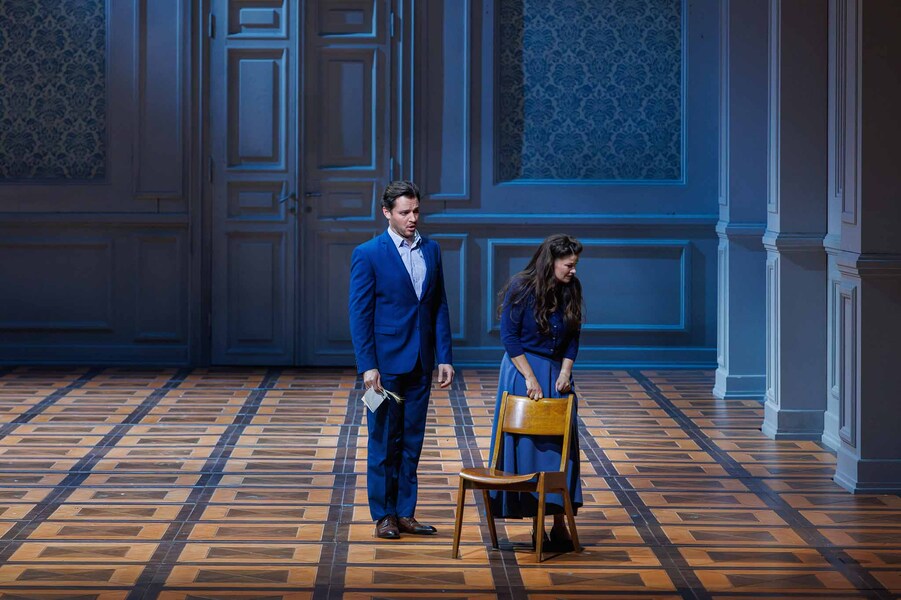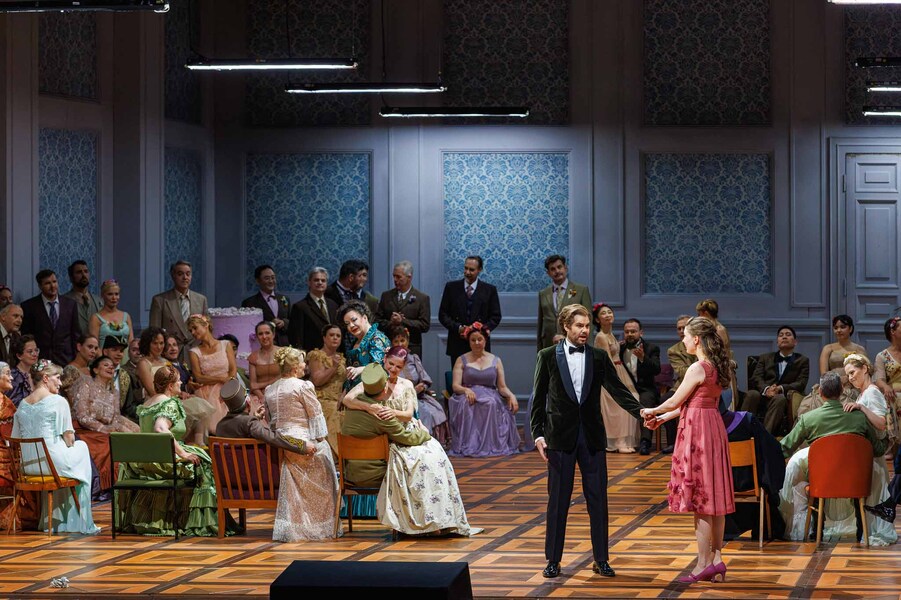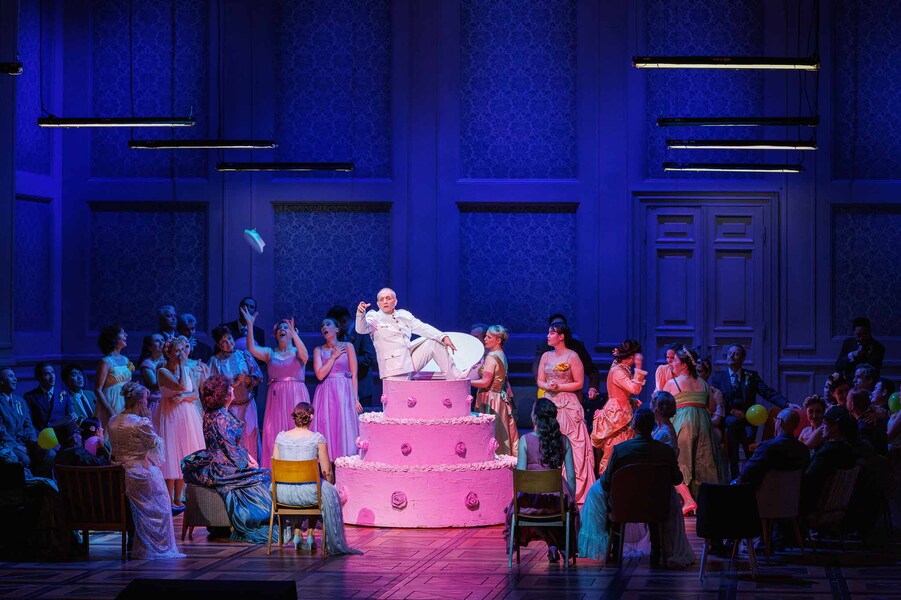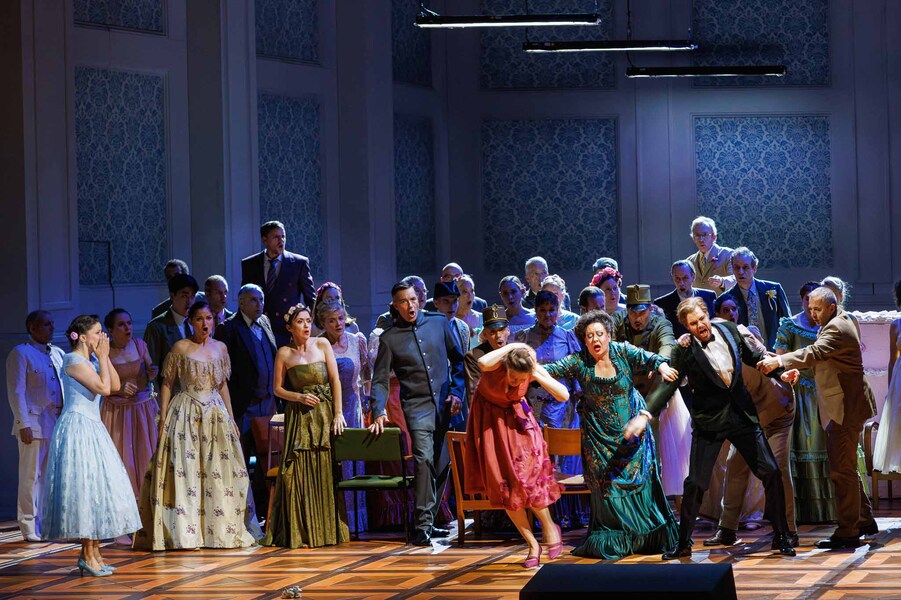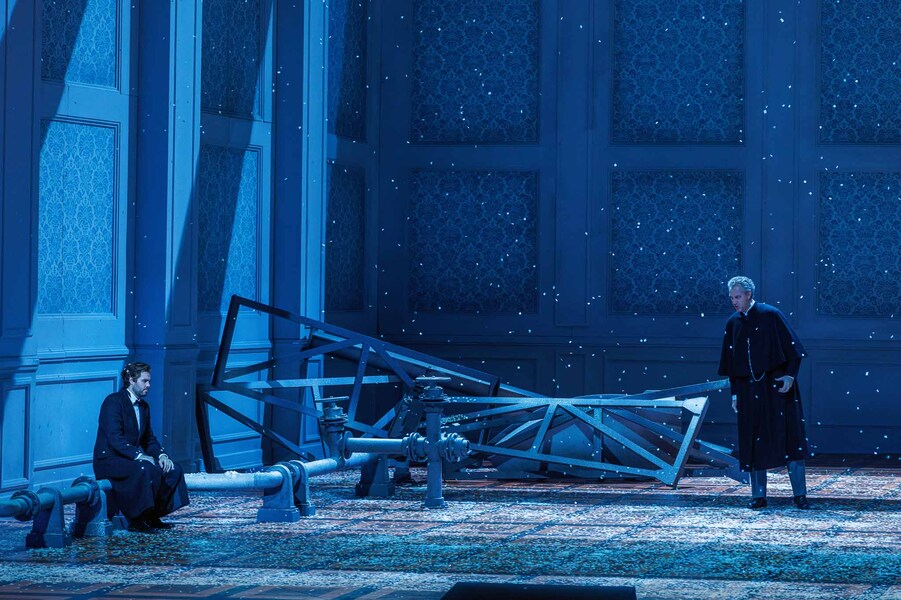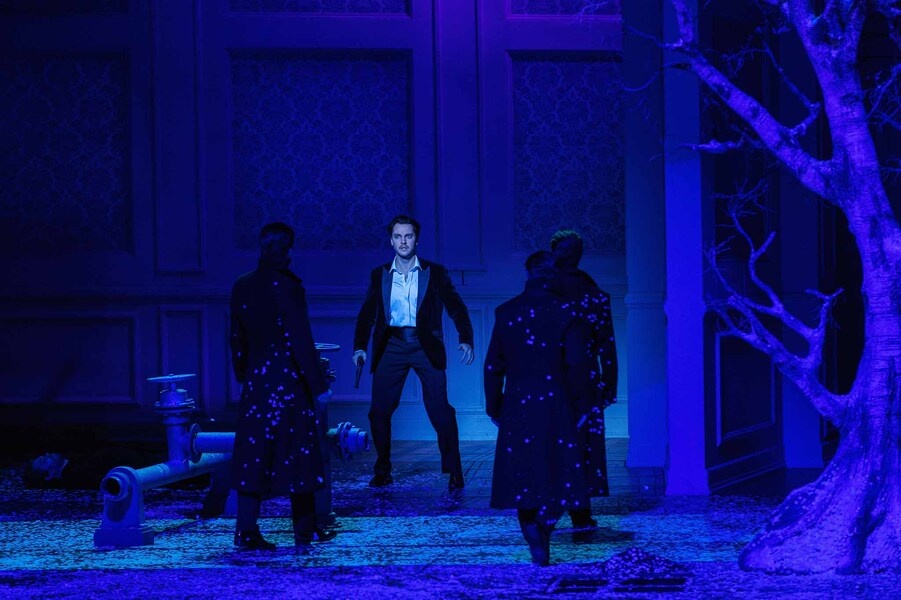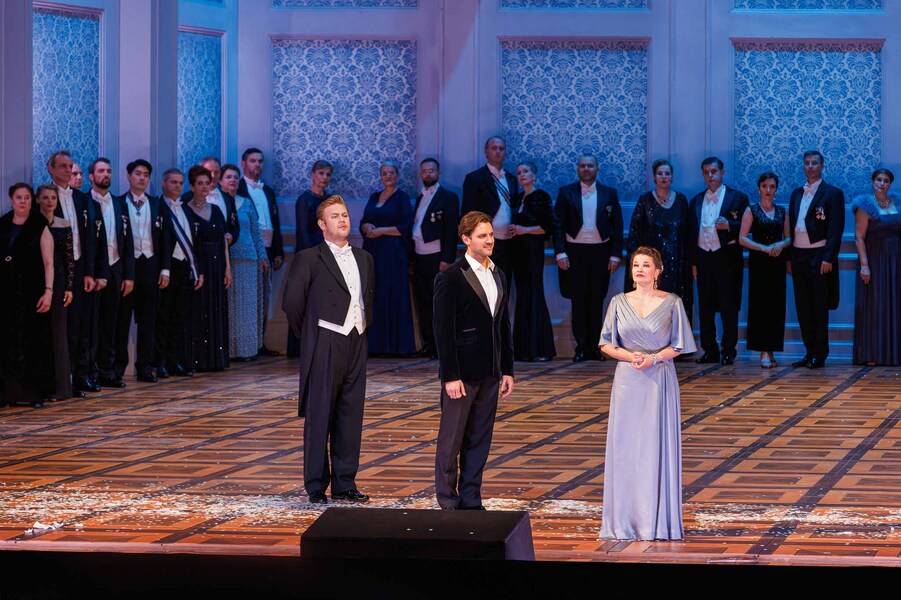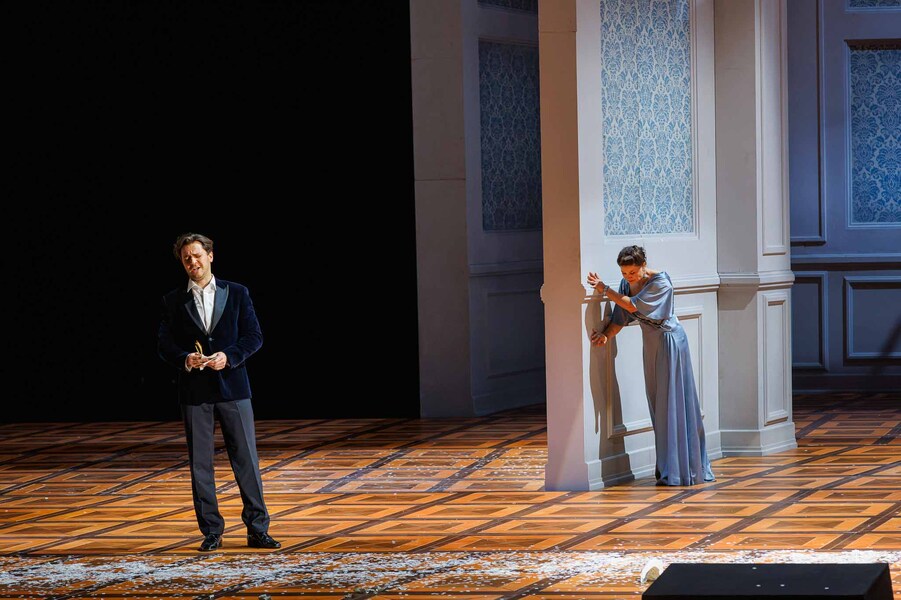No other opera shows the torment and pain of lost love with such clarity.
Lyrical scenes in three acts (seven scenes)
Libretto by Pyotr I. Tchaikovsky and Konstantin S. Schilowsky after the novel by Alexander Puschkin
Performed in Russian with German and English supertitles
Premiere
30. June 2016
Dates & Cast
- Conductor Oksana Lyniv
- Staging Markus Bothe
- Set Design Robert Schweer
- Costume Design Esther Geremus
- Lighting Design Fabio Antoci
- Choreography Teresa Rotemberg
- Choir Jonathan Becker
- Dramaturgy Valeska Stern
- Larina Sabine Brohm
- Tatjana Marjukka Tepponen
- Olga Nicole Chirka
- Filipjewna Michal Doron (29. August, 07., 12. September 2025), Elena Zaremba (03. September 2025)
- Lenski Thomas Atkins
- Eugen Onegin Danylo Matviienko
- Triquet James Kryshak (29. August, 03., 07. September 2025), Aaron Pegram (12. September 2025)
- Fürst Gremin Ilia Kazakov
- Saretzki Tilmann Rönnebeck
- Ein Hauptmann Reinhold Schreyer-Morlock (29. August, 07., 12. September 2025), Martin Schubert (03. September 2025)
- Vorsänger Frank Blümel (29. August, 07. September 2025), Jun-Seok Bang (03., 12. September 2025)
- Guillot Alexandre Tourinho
- Conductor Oksana Lyniv
- Staging Markus Bothe
- Set Design Robert Schweer
- Costume Design Esther Geremus
- Lighting Design Fabio Antoci
- Choreography Teresa Rotemberg
- Choir Jonathan Becker
- Dramaturgy Valeska Stern
Sächsische Staatskapelle Dresden
Generously supported by the Semperoper Foundation
- Larina Sabine Brohm
- Tatjana Marjukka Tepponen
- Olga Nicole Chirka
- Filipjewna Michal Doron
- Lenski Thomas Atkins
- Eugen Onegin Danylo Matviienko
- Triquet James Kryshak
- Fürst Gremin Ilia Kazakov
- Saretzki Tilmann Rönnebeck
- Ein Hauptmann Reinhold Schreyer-Morlock
- Vorsänger Frank Blümel
- Guillot Alexandre Tourinho
- Conductor Oksana Lyniv
- Staging Markus Bothe
- Set Design Robert Schweer
- Costume Design Esther Geremus
- Lighting Design Fabio Antoci
- Choreography Teresa Rotemberg
- Choir Jonathan Becker
- Dramaturgy Valeska Stern
Sächsische Staatskapelle Dresden
Generously supported by the Semperoper Foundation
- Larina Sabine Brohm
- Tatjana Marjukka Tepponen
- Olga Nicole Chirka
- Filipjewna Elena Zaremba
- Lenski Thomas Atkins
- Eugen Onegin Danylo Matviienko
- Triquet James Kryshak
- Fürst Gremin Ilia Kazakov
- Saretzki Tilmann Rönnebeck
- Ein Hauptmann Martin Schubert
- Vorsänger Jun-Seok Bang
- Guillot Alexandre Tourinho
- Conductor Oksana Lyniv
- Staging Markus Bothe
- Set Design Robert Schweer
- Costume Design Esther Geremus
- Lighting Design Fabio Antoci
- Choreography Teresa Rotemberg
- Choir Jonathan Becker
- Dramaturgy Valeska Stern
Sächsische Staatskapelle Dresden
Generously supported by the Semperoper Foundation
- Larina Sabine Brohm
- Tatjana Marjukka Tepponen
- Olga Nicole Chirka
- Filipjewna Michal Doron
- Lenski Thomas Atkins
- Eugen Onegin Danylo Matviienko
- Triquet James Kryshak
- Fürst Gremin Ilia Kazakov
- Saretzki Tilmann Rönnebeck
- Ein Hauptmann Reinhold Schreyer-Morlock
- Vorsänger Frank Blümel
- Guillot Alexandre Tourinho
- Conductor Oksana Lyniv
- Staging Markus Bothe
- Set Design Robert Schweer
- Costume Design Esther Geremus
- Lighting Design Fabio Antoci
- Choreography Teresa Rotemberg
- Choir Jonathan Becker
- Dramaturgy Valeska Stern
Sächsische Staatskapelle Dresden
Generously supported by the Semperoper Foundation
- Larina Sabine Brohm
- Tatjana Marjukka Tepponen
- Olga Nicole Chirka
- Filipjewna Michal Doron
- Lenski Thomas Atkins
- Eugen Onegin Danylo Matviienko
- Triquet Aaron Pegram
- Fürst Gremin Ilia Kazakov
- Saretzki Tilmann Rönnebeck
- Ein Hauptmann Reinhold Schreyer-Morlock
- Vorsänger Jun-Seok Bang
- Guillot Alexandre Tourinho
In brief
Tired of the big city and its abundance of parties and women, the dandy Eugene Onegin travels to the countryside, where he meets Tatjana, the daughter of an estate owner. Dreaming of romantic love as described in books, she thinks she has found it in Onegin. However, he is unwilling to be tied down. After brusquely rejecting her, it is only years later that Onegin comes to understand his awful mistake and his lack of courage. Yet the realization comes too late: Tatjana has already become the wife of Prince Gremin. Tchaikovsky based his touching and intimate masterpiece from 1878 on the novel in verse by Alexander Pushkin. The opera not only illuminates the torn inner lives of the protagonists, but also the pitfalls of modern relationships. Markus Bothe breaks up the story's chronology using flashbacks of the various characters to create an allusive series of images in which memory, mood and the drama of the present flow seamlessly into one another.
Storyline
Scene one
An afternoon on the Larin country estate: nurse Filipievna is doing the housework whilst Madame Larina is again lamenting the introvert behaviour of her daughter Tatiana. She only wishes to read in peace but is always prevented from doing so by her mother – be it either with her lamenting her youth or the songs of the peasants who sing at Larina’s behest. Olga attempts to help her sister and tries to turn Tatiana’s mind onto other things. Then a visitor is announced: Olga’s betrothed, Lenski, introduces his new neighbour, Onegin. Whilst the family is irritated by the stranger’s behaviour which goes against all etiquette, his unconventional manner awakens the interest of Tatiana. Could he be her true love of which her books tell?
Scene two
Tatiana is too agitated to sleep. She asks Filipievna to tell her something about love but her story is not a happy one: she had to marry someone chosen by her parents. On her own, Tatiana starts to write a letter in which she confesses her love to Onegin. When Filipievna wants to wake up the girl the next morning she realises what happened during the night. Despite her initial hesitation, she cannot refuse Tatiana’s wish and takes the letter to give to Onegin.
Scene three
Impatiently and nervously, Tatiana awaits Onegin’s reaction. When he is finally standing in front of her, all her hope disappears: he coldly rejects her.
Scene four
It is Tatiana’s name day and the whole neighbourhood has met for a party. Whilst everyone is amusing themselves, Tatiana wishes she could just disappear and Onegin is also annoyed for having been dragged to the ball by Lenski. To take revenge on his friend and spurred on by the gossip of the guests, he starts to flirt with Olga in front of everyone. The situation escalates and Lenski challenges Onegin to a duel.
Scene five
Lenski is waiting for Onegin, who turns up late, with his second Saretzki. In remembrance of past years, Lenski bids farewell to his love and his life. When the friends are standing opposite one another shortly afterwards, as opponents, no-one can bring themselves to say the words of reconciliation. The duellers reach for their weapons, Onegin shoots and Lenski falls.
Scene six
The ghosts of the past haunt Onegin and, after many years of travel, he returns to St. Petersburg where he ends up going to a ball. Here the royal host Gremin proudly presents his wife who is none other than Tatiana. It suddenly dawns upon Onegin that he loved Tatiana the whole time and that he can only be happy with her.
Scene seven
The situation has reversed and now Onegin confesses his love to Tatiana in a letter but although she still loves him she rejects him. As much as Onegin begs her, he cannot keep her and she flees into her life with Gremin. Onegin is left behind alone.
Explore
Eugen Onegin
